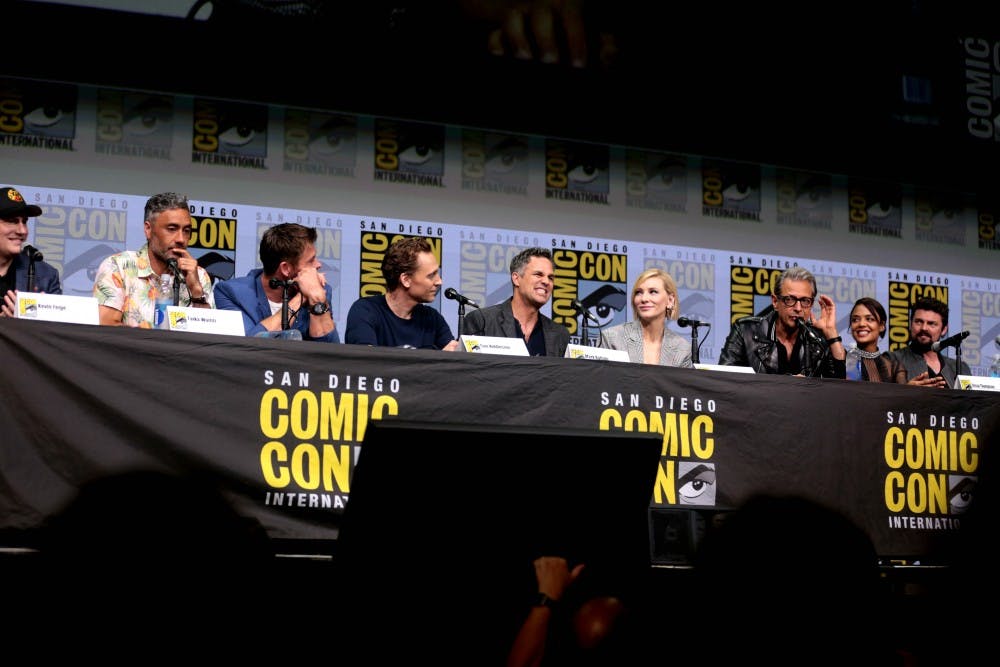Ever since Marvel Studios attached the post-credits scene of Samuel L. Jackson’s Nick Fury talking to Robert Downey Jr.’s Iron Man at the end of Iron Man, fans have been treated to about 17 films, a few network TV shows and multiple mini-series on Netflix that have expanded the Avengers universe.
Unfortunately, the consequence of creating an interconnected universe is two fold: You get films where the consequences aren’t in any way actual consequences (you know Iron Man is going to win because he needs to be there in the next Avengers Movie), and all the films come off as monochromatic, monotonous and at times cringe-worthy, no matter who is behind the director’s chair.
The lack of change has made it quite difficult for me to enjoy any of the most recent movies following Captain America: The Winter Soldier, which happens to be the last Marvel movie that feels unique in its premise.
When it was announced that “Phase Three” (any movie after the horrendous Ant-Man) would open the door to a wider Marvel Universe, I was originally apathetic. I wanted to see what characters we would get and who would be in charge of these characters. Marvel had promised us Captain Marvel, Black Panther (finally) and the long-awaited (hah!) third Thor Movie.
However, because the studio was able to get the rights to make a Spider-Man film, Captain Marvel and Black Panther got pushed back.
The only thing that wasn’t pushed back was the third Thor movie, which, to be fair, wasn’t really something people would be looking forward to.
If you don’t believe me, please tell me what happens in Thor: The Dark World down in the comments — without Googling it.
So the idea that Marvel was going to make Thor 3, attempt to adapt “Ragnarok” (the rough Norse mythological equivalent to the apocalypse) and make it worth our time, all before the Avengers faced off against Thanos, (the giant purple dude in Guardians of The Galaxy) was a bit laughable.
That being said, the studio managed to get my attention when they tapped New Zealander director Taika Waititi as the director.
Waititi is known for his films Hunt for the Wilderpeople, Boy and What We Do in the Shadows. The first two have been the top grossing films in the New Zealand box office, and What We Do in the Shadows has become a cult hit.
The common thread among these three films is that they were all comedic, something that the Marvel Cinematic Universe has lacked.
Nonetheless, I was still excited. What We Do in the Shadows is one of the best, if not the best, vampire comedy of all time so I was sure that Thor: Ragnarok would, at the very least, actually be funny. Thankfully, I underestimated Waititi and was blessed with a Thor movie that was not only good, but was also one of the best Marvel movies.
The problem with previous Thor movies was that they felt so restricted. We have a character that comes from a world rich in history, but we’ve spent most of our time on Earth, and Hemsworth is frequently forced to portray a stoic character with no personality.
All of these issues are addressed in Thor: Ragnarok. Hemsworth gets a chance to shine, using his looks and charisma to deliver jokes that land well and feel more natural than they usually do in a Marvel movie.
It also helps that he finally has a decent haircut and is surrounded by actors that seem to actually want to be in a superhero movie. Tom Hiddleston as Loki is his usual great self, while Tessa Thompson as Valkyrie is outstanding, delivering the emotional pain that one would expect from someone that battled the god of death and lost her lover in the battle.
Jeff Goldblum is fantastic. I’m almost certain that all of his lines were ad-libbed. His character’s ridiculousness only adds to the myth, the legend, that is Goldblum himself.
However, just like with every Marvel movie, there’s some characters that don’t really have much to do. As much as I want to tattoo Cate Blanchett as Hela onto my chest, her character is the definition of campy and is often used to dump exposition onto the audience.
Hela is there to remind us of the sins of Odin and to spell out a thinly-veiled metaphor about American imperialism. Karl Urban as Executioner is kind of just there — used as a sort of dumb henchman — though he does get his chance to shine towards the film’s end.
Bruce Banner (Mark Ruffalo) is great when placed as a foil to the Hulk, but there are moments where there could be more depth to him. The film would benefit from more of a focus on Banner’s reaction to finding out he’s been the Hulk for such a long time.
Plot-wise, the first act is a tad messy, with the inclusion of Doctor Strange being incredibly unnecessary. It felt as if Thor: Ragnarok was trying to tie up loose ends that previous films had left open.
I would be remiss to neglect Korg, played by Waititi, who is an absolute standout in a minor role. He gets the best lines and makes the most from it.
Thor: Ragnarok understands that the most interesting aspect about superheroes is both the heroes and those who surround them. Waititi’s unique comedic eye elevates the characters, who are paired with what sounds like the first unique Marvel score, and hits a homerun. Go watch it, you’ll have a blast.





